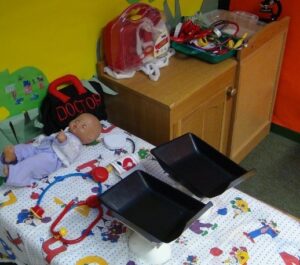Sarah Jane Mukherjee, Research Associate, The Centre for Literacy and Social Justice, The Open University

Rich insights into learning opportunities in playful classroom contexts can be sought through research into children’s peer to peer language. To do this, the language must be captured through recordings before a researcher is able to hold a magnifying glass to linguistic playful interactions, yet ethical dilemmas around children’s consent overshadow the ease in which an audio or video recording can be made. How can a researcher be confident to capture young children’s consent? Flewitt suggests provisional consent, to acknowledge that the implications of research are unlikely to be fully understood by young children, and ongoing consent as ‘negotiated in situated contexts on a minute by minute basis’. Here, I reflect on ways in which I addressed the research challenge of consent in my naturalistic study of children’s learning in classroom role-play with small groups of 4-5-year-old children.
Empower the children to refuse to participate. For children, withdrawing from a study should be as easy as agreeing to participate. I wanted the children to be able to say to me that they had changed their minds. The time before the study started was important in this; I wanted to build a relationship with the children. Recognising that an adult I may be perceived as a teacher I introduced myself by my first name – in contrast to the teachers who were all addressed traditionally e.g. Mrs Cook – to reduce the formality of my presence. In addition, I spent time in the classroom reading, playing and chatting with them with the aim that the children would feel comfortable to refuse to take part in the study should they wish.
Make the research process visible. Ahead of each recording, I reminded the children about the research and was sensitive to cues that might suggest they were uncomfortable participating. I positioned the two video cameras deliberately visible for the children, and I asked them to turn on the recorders and place the audio recorder in the space. Although it might be thought that this could draw too much attention to the recorders, and that this might mean that the playful language I sought to capture, would be eclipsed by the children playing for the camera, the recorders were not intrusive in this way. The recordings showed that largely the presence of the equipment did not influence the spontaneity and naturalness of their play language. However, importantly the equipment was not completely forgotten and thus the research process remained visible. For instance, on occasion, the children would look though the viewer to see their peers ‘I can see you’; reference the recorders and research ‘there’s one there…she has recorded our voices’. For me these quotes provided some evidence that the children’s provisional and ongoing consent had been achieved.
What steps do you take in your data collection to support your child participants’ provisional and ongoing consent?

Sarah Jane Mukherjee joined the OU in May 2020 and is a Research Associate in the new Centre for Literacy and Social Justice. Her PhD explored children’s meaning making in classroom role-play using systemic functional linguistics. She is currently Co-I on a project exploring children’s picture fiction.
http://wels.open.ac.uk/people/sjm2348
@sjmukherjee0702